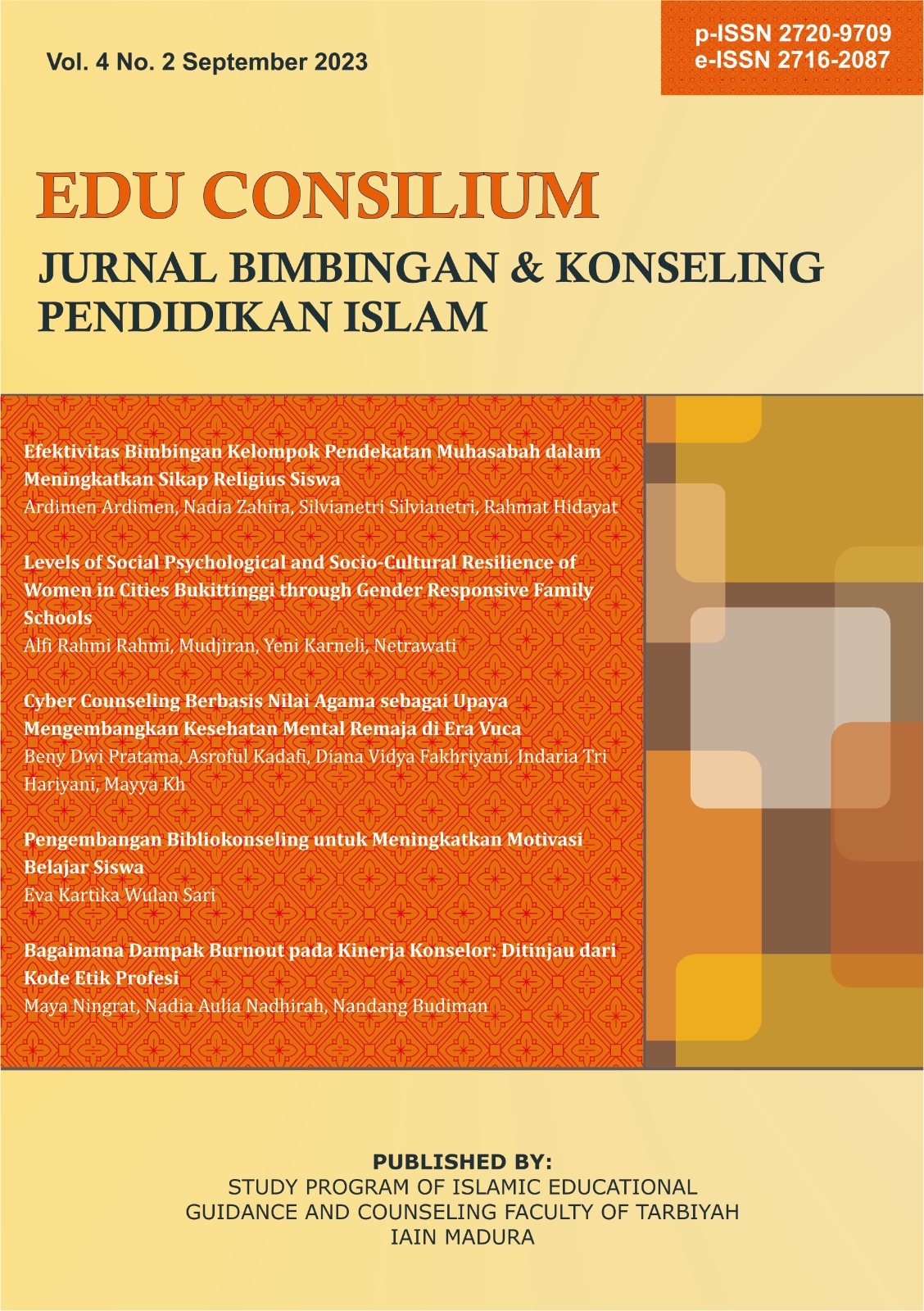Levels of Social Psychological and Socio-Cultural Resilience of Women in Cities Bukittinggi Through Gender Responsive Family Schools
 Abstract views: 191
,
Abstract views: 191
,
 PDF downloads: 182
PDF downloads: 182
Abstract
This study aims to reveal the level of social psychological and socio-cultural resilience of women in the city of Bukittinggi. The vulnerability of families experiencing family resilience problems, so the City Government of Bukittinggi established a Family School. Through the Family School, materials and training are provided for women who have families to maintain the resilience of their families. This type of research is descriptive and quantitative with a total sample of 86 people who have attended the Family School. Data was collected using a Family Resilience questionnaire that had been formulated by the Ministry of Women and Children's Empowerment (KPPA). The results showed that the Dimensions of Psychological Social Resilience with the following categories were Not Resistant 12 people, Sufficiently Resistant 73 people, and Resistant only 1 person. For the Socio-Cultural Dimension, 27 people are Not Resistant, 53 people are Sufficient, and 6 people are Resistant. In general, the level of family resilience in women who have attended Family Schools is Sufficient Level of Having Family Resilience
Downloads
References
Alfi Rahmi & Januar. (2019). Pengokohan Fungsi Keluarga Sebagai Upaya Preventif Terjadinya Degradasi Moral Pada Remaja. Journal at Taujih, 53(9), 1689–1699. https://doi.org/10.15548/atj.v5i1.755
Altareb, B. (2008). The Practice of Marriage and Family Counseling and Islam. In Onedera, Jill Duba (Ed.). The role of religion in marriage and family counseling. RoutledgeTaylor & Francis Group.
Amalia, R. M., Akbar, M. Y. A., & Syariful, S. (2018). Ketahanan Keluarga dan Kontribusinya Bagi Penanggulangan Faktor Terjadinya Perceraian. JURNAL Al-AZHAR INDONESIA SERI HUMANIORA, 4(2), 129. https://doi.org/10.36722/sh.v4i2.268
Badan Pusat Statistik. (2016a). PEMBANGUNAN KETAHANAN KELUARGA. kementerian pemberdayaan perempuan dan perlindungan anak.
Badan Pusat Statistik. (2016b). PEMBANGUNAN KETAHANAN KELUARGA 2016. kementerian pemberdayaan perempuan dan perlindungan anak.
Cahyaningtyas A, T. A., Triana D, Prastiwi DA, N., & EH, Jamilah, A. N. T. V. (2016). Pembangunan Ketahanan Keluarga 2016. CV. Lintas Khatulistiwa; 2016. 39.
Doddy Sumbodo Singgih. (2006). Masalah-masalah Sosial Di Indonesia. Masyarakat Kebudayaan Dan Politik, 1–13.
Istiqlailia, N., & Sa'idah, I. (2021). Hubungan Antara Self Efficacy dengan Pengambilan Keputusan Karier pada Siswa Kelas XII Putri MA Miftahul Qulub Galis Pamekasan. Edu Consilium: Jurnal Bimbingan Dan Konseling Pendidikan Islam, 2(2). https://doi.org/10.19105/ec.v2i2.4937
Kaba12.com. (2022). eserta Sekolah Keluarga Angkatan IV tahun 2022.
Musfiroh, M., Mulyani, S., Cahyanto, E. B., Nugraheni, A., & Sumiyarsi, I. (2019). Analisis Faktor-Faktor Ketahanan Keluarga Di Kampung Kb Rw 18 Kelurahan Kadipiro Kota Surakarta. PLACENTUM: Jurnal Ilmiah Kesehatan Dan Aplikasinya, 7(2), 61. https://doi.org/10.20961/placentum.v7i2.32224
Park, M., Kim, S., Lee, H., Shin, Y. J., Lyu, C. J., & Choi, E. K. (2023). Development and effects of an internet-based family resilience-promoting program for parents of children with cancer: A randomized controlled trial. European Journal of Oncology Nursing, 64, 102332. https://doi.org/https://doi.org/10.1016/j.ejon.2023.102332
UNDANG-UNDANG REPUBLIK INDONESIA NOMOR 52 TAHUN 2009 TENTANG PERKEMBANGAN KEPENDUDUKAN DAN PEMBANGUNAN KELUARGA, (2009).
Purwandiyah H. (2013). Implementasi Program Keluarga Berencana Dalam Pembangunan Keluarga Sejahtera (Studi di Kec. Telen Kabupaten Kutai Timur, Propinsi Kalimantan Timur). Unmul, 3(1). ejournals.unmul.ac.id/index.php/JPara%0Adigma/article/download/348/309
Rosenberg, A., Wolfe, J., Syrjala, K., Yi-Frazier, J., Curtis, J. R., & Baker, S. (2014). The Impact of Personal Resilience Resources on Psychosocial Outcomes in Parents of Children with Cancer (SA509-C). Journal of Pain and Symptom Management, 47(2), 451–452. https://doi.org/https://doi.org/10.1016/j.jpainsymman.2013.12.205
Sa'idah, I. (2019). Teori dan Teknik Konseling.
Sa'idah, I., Atmoko, A., & Muslihati, M. (2021). Aspirasi Karier Generasi Milenial. Edu Consilium: Jurnal Bimbingan dan Konseling Pendidikan Islam, 2(1), 62-89. https://doi.org/10.19105/ec.v2i1.4429
Sugiono. (2015). Metedologi Penelitian Pendidikan (Pendekatan Kuantitatif,Kualitatif, Dan R&D). Alfabeta.
Thariq, M. (2018). Membangun Ketahanan Keluarga dengan Komunikasi Interpersonal. JURNAL SIMBOLIKA: Research and Learning in Communication Study, 3(1), 34. https://doi.org/10.31289/simbollika.v3i1.1204
Zahira, P., & Mashur, D. (2022). Efektivitas Program Sekolah Keluarga di Kota Bukittinggi. Journal of Social and Policy Issues, 2, 72–77. https://doi.org/10.58835/jspi.v1i2.17
The journal operates an Open Access policy under a Creative Commons Non-Commercial 4.0 International license. Authors who publish with this journal agree to the following terms:
- Authors retain copyright and grant the journal right of first publication with the work simultaneously licensed under a
 Commons Attribution-NonCommercial 4.0 International License
Commons Attribution-NonCommercial 4.0 International Licensethat allows others to share — copy and redistribute the material in any medium or format, and adapt — remix, transform, and build upon the material.
- Authors are able to enter into separate, additional contractual arrangements for the non-exclusive distribution of the journal's published version of the work (e.g., post it to an institutional repository or publish it in a book), with an acknowledgement of its initial publication in this journal.
- Authors are permitted and encouraged to post their work online (e.g., in institutional repositories or on their website) prior to and during the submission process, as it can lead to productive exchanges, as well as earlier and greater citation of published work (see The Effect of Open Access).




















